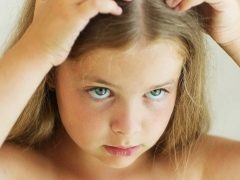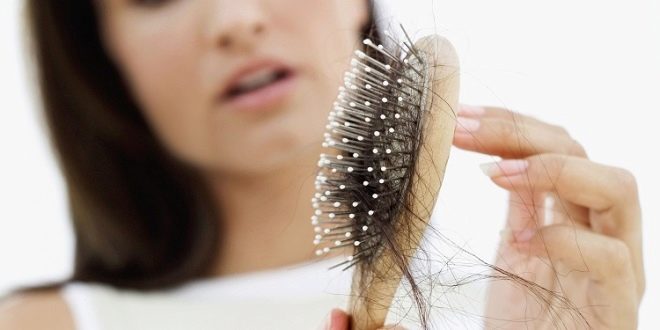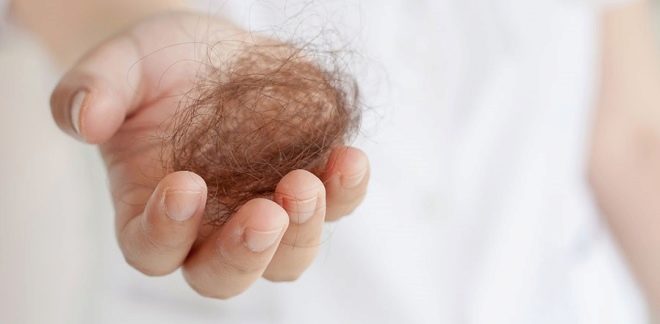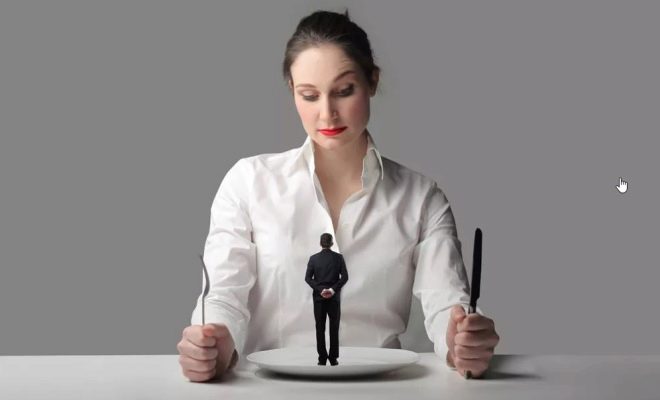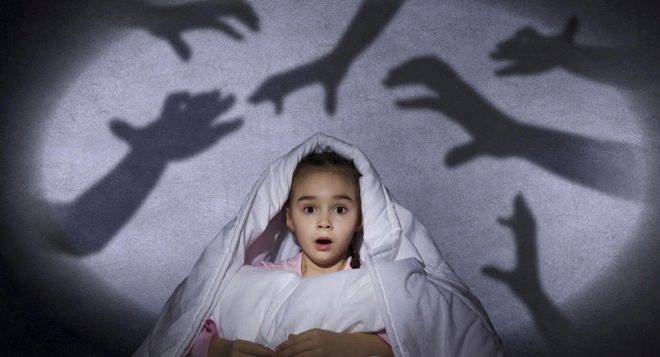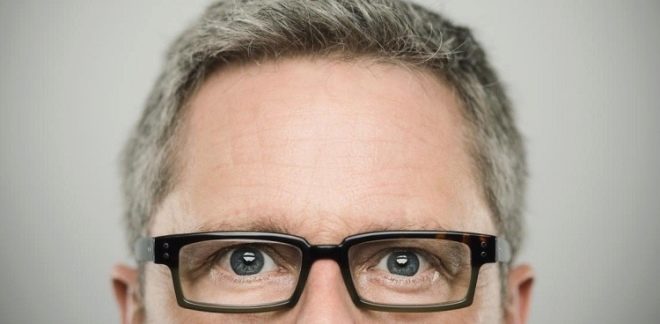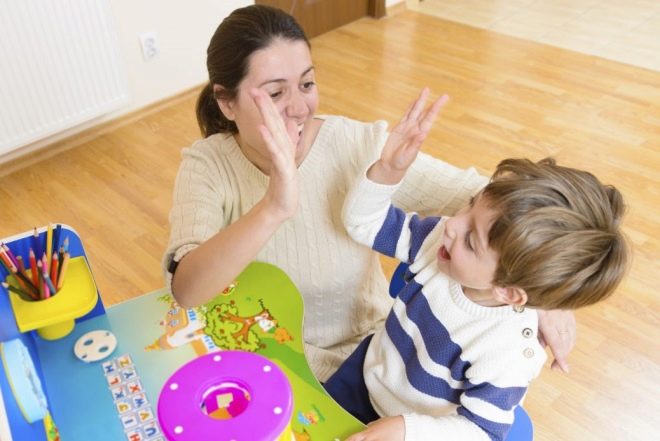Psychosomatic causes of hair problems in children and adults
Problems with the condition of the hair are not only in adults but also in children. Sometimes even the right care and taking of vitamins does not help to stop excessive hair loss, their cross-section, and even medical cosmetics do not always help to cope with dandruff or seborrheic plaques on the scalp. The fact is that so many problems with hair are closely related to the mental and emotional state of a person, regardless of his age or gender.
It is about the psychosomatic causes of impaired hair health, and we will discuss in this article.
Rates and deviations
The hair is the outermost protective layer of the epidermis. They cover our entire body, just the thickest hair present on the scalp. Regardless of the location of each hair grows root in the epidermis, and as long as the hair bulb is alive, the hair itself is alive. From time to time hair is renewed, reaching the extreme point of growth.
Hair loss in medicine is considered their massive loss. Up to 60-100 hairs per day is the physiological norm, exceeding it is called alopecia. Hair loss, the body often signals about other diseases - for example, in syphilis or radiation sickness, focal alopecia almost always develops.
Hair is very sensitive to hormonal background, to sufficient levels of calcium and vitamins entering the body with food, as well as to the psychological state of a person, and evidence-based medicine fully agrees with psychosomatic on this issue - very often problems with hair (falling out, dandruff, seborrhea) begin exactly when a person is going through difficult times associated with severe stress.
Psychosomatic causes
Psychosomatics assesses not only the totality of metabolic and hormonal processes with human physiology, it clearly traces the psychological and mental factors that can lead to baldness or disruption of the hair in any part of the body.
Hair in psychosomatic medicine symbolizes protection, strength, connection with spirituality. That is why the hair of the main characters of fairy tales and myths often attributed almost magical properties. From the point of view of evolutionary processes, modern man has absolutely no need for hair - they no longer protect us from cold and sun, clothes and hats do it. But the hair in the course of evolution did not fall out completely, which means that they are needed.
Psychosomatics treats them as the connection of a person with his own spiritual component, with a sense of security and confidence.. That is why not only women, but also men experience pronounced inconveniences of a psychological nature, suddenly finding themselves bald (for example, due to total alopecia).
Hair - sensors that respond to an approaching dangerous situation, which is why the phrase that fear is “hair on end” is common in people. Hair loss increases anxiety, anxiety.
Psychoanalysts have been able to bring out several psychological portraits of adults who are more prone to problems with hair. First of all, it is people who have experienced severe and prolonged stress on the verge of psycho-shock. Such situations may be the loss of a loved one, the loss of their own working ability due to disability.
Also included here people who for quite a long time in a certain life situation were in a state of helplessness and extreme despair. A person may react to severe stress with excessive agitation and stupor.
In all these cases, regardless of the exact type of reaction to shock events, the person has experienced a strong shock.. In this state, the conduction of nerve impulses is disturbed and the nervous system begins to work in the “wartime” mode: the blood supply to the main organs increases (the heart beats more often, the blood rushes to the head), and the skin, nails, hair begin to be supplied with blood, respectively, in a smaller volume . This is the mechanism of hair loss is considered as the main.
One more psycho-type of people with hair problems - disappointed, experiencing a collapse of hopes and plans due to certain events that have deprived them of hope and faith. Such a psycho-type manifests itself most vividly by the example of people who have long believed in one religion or another, and then suddenly became disillusioned with their god, with their faith. Almost all post-stress condition is accompanied by hair loss. Therefore, some researchers can meet the cause, which is described as a violation of communication with the divine, spiritual principle.
Third psycho - people who can not or do not want to be what they really are. They deny some part of themselves, more often - they do not like their appearance. They do not believe and do not trust others, do not have religious beliefs. Hair falls out as a sign of the absence of a “fulcrum”.
Fourth type of people - those who want to establish total control over everything that happens around. It is for this reason that managers with great experience often have so bad things about their own hair (remember how many bald or balding bosses and directors you have seen in life!).
In children and adolescents
Due to fear, almost all hair problems develop in children. In childhood, the reason for fear can be faith in the monsters that come at night, but more often the problem is quite real - there is violence and threats in the family of the child. Even if the violence is directed not at the child, but at his mother or grandmother, who are being bullied, beaten, harassed, the child lives in constant fear. Such children are more likely to have not only sick, thin and split hair, but also ingrown hair, which causes a completely independent inflammation, sometimes purulent.
The greater the fear, the greater the likelihood that the hair will begin to “get too greasy” - sebaceous glands are activated to protect the body in a state of danger. Against the background of their excessive function, seborrhea can develop.
Fear of a child can be associated with someone or something that scares him not only at home, but also in kindergarten, school. In adolescents, increased hair greasiness is not only a consequence of pubertal hormonal adjustment, but also a sign of self-doubt, a defense mechanism from the outside world.which can not accept, not support and not share the aggravated feelings of the young man or girl.
Fears of impressionable children can cause threats of elders to "call Babayk", "give to an orphanage" (and parents say that in their hearts to their naughty children!).
Causes of impaired structure and hair growth
Gray hair and excessive hairiness in evidence-based medicine is often associated with heredity. This can not be denied, but there are also cases when very young people turn gray while their parents and 60 are not gray at all.
Hair loss of pigment is often attributed to metabolic features, hormonal changes. In adults and young people, early gray hair is usually associated with a prolonged state of stress on the background of fear.. So, before men and women who have debts, to pay off which does not work out before, turn out before painting a pigment in hair people who work under the authority of the despotic boss or live with the house tyrant lose.
Increased hairiness can be developed in people not only in violation of the hormonal background of the male type (androgenic cause), but also in those who feel so insecure that they absolutely do not want to communicate with the outside world. With a coat of hair in abundance, a person as if “hides”, masks, tries to “scare away” those around him.
Dry hair
Brittle hair is an unpleasant picture, while it is quite widespread among both children and adults. Most often, brittleness is attributed to a lack of calcium, unbalanced nutrition, overdrying of hair (hair dryer, sunlight). In fact, even with proper nutrition and care, brittle hair sometimes develops, when the hair does not fall out entirely, and only part of it falls off.
Psychosomatic tables of diseases that were made up of famous researchers, such as Liz Burbo, Louise Hay, say that hair breakage is a signal that a person has lost touch with the spiritual and concentrated on the material.
The psychoanalytic point of view is somewhat different: a person is too suspicious and dramatizes the "villains" of the people around him, and therefore his body at the subconscious level begins to "disarm", get rid of excess calcium.
Note that along with brittle hair in varying degrees, the patient has brittle nails.
How to be treated?
First you need to visit a doctor who is called a trichologist. This is a specialist in hair diseases. It will help establish an accurate diagnosis and identify the scale of the problem. Then it is recommended to follow his appointments, medicine today has various methods for treating hair roots.
Simultaneously with traditional treatment, psychotherapy sessions will not be superfluous., because without getting rid of the same fear to solve the problem with the hair only with the help of shampoo or medical masks just will not work. The problem will come back every time a person is in a stressful situation.
Psychosomatic recommendations are quite extensive and depend on the cause.
If a person is too powerful, he should trust others more and give up total control. After the grief and strong shocks experienced, adults and children need advice from a clinical psychologist, because the ways out can be different. For those who are afraid of all children, individual and play activities with a child psychologist are provided.
